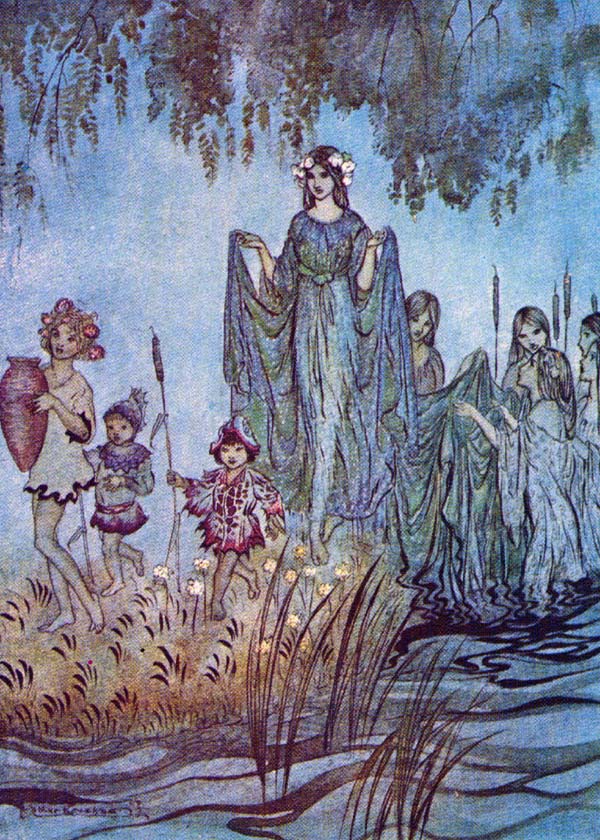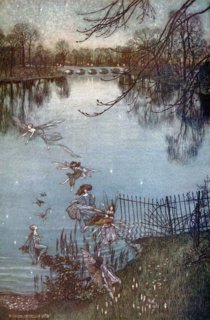
Once, long ago, there lived near the ancient city of Strasburg, on the river Rhine, a young and handsome count, whose name was Otto. As the years flew by he remained unwed, and never so much as cast a glance at the fair maidens of the country round; for this reason people began to call him “Stone-Heart.”
It chanced that Count Otto, on one Christmas Eve, ordered that a great hunt should take place in the forest surrounding his castle. He and his guests and his many retainers rode forth, and the chase became more and more exciting. It led through thickets, and over pathless tracts of forest, until at length Count Otto found himself separated from his companions.
He rode on by himself until he came to a spring of clear, bubbling water, known to the people around as the “Fairy Well.” Here Count Otto dismounted. He bent over the spring and began to lave his hands in the sparkling tide, but to his wonder he found that though the weather was cold and frosty, the water was warm and delightfully caressing. He felt a glow of joy pass through his veins, and, as he plunged his hands deeper, he fancied that his right hand was grasped by another, soft and small, which gently slipped from his finger the gold ring he always wore. And, lo! when he drew out his hand, the gold ring was gone.
Full of wonder at this mysterious event, the count mounted his horse and returned to his castle, resolving in his mind that the very next day he would have the Fairy Well emptied by his servants.He retired to his room, and, throwing himself just as he was upon his couch, tried to sleep; but the strangeness of the adventure kept him restless and wakeful.
Suddenly he heard the hoarse baying of the watch-hounds in the courtyard, and then the creaking of the drawbridge, as though it were being lowered. Then came to his ear the patter of many small feet on the stone staircase, and next he heard indistinctly the sound of light footsteps in the chamber adjoining his own.
Count Otto sprang from his couch, and as he did so there sounded a strain of delicious music, and the door of his chamber was flung open. Hurrying into the next room, he found himself in the midst of numberless Fairy beings, clad in gay and sparkling robes. They paid no heed to him, but began to dance, and laugh, and sing, to the sound of mysterious music.
In the center of the apartment stood a splendid Christmas Tree, the first ever seen in that country. Instead of toys and candles there hung on its lighted boughs diamond stars, pearl necklaces, bracelets of gold ornamented with colored jewels, aigrettes of rubies and sapphires, silken belts embroidered with Oriental pearls, and daggers mounted in gold and studded with the rarest gems. The whole tree swayed, sparkled, and glittered in the radiance of its many lights.
Count Otto stood speechless, gazing at all this wonder, when suddenly the Fairies stopped dancing and fell back, to make room for a lady of dazzling beauty who came slowly toward him.
She wore on her raven-black tresses a golden diadem set with jewels. Her hair flowed down upon a robe of rosy satin and creamy velvet. She stretched out two small, white hands to the count and addressed him in sweet, alluring tones:—
“Dear Count Otto,” said she, “I come to return your Christmas visit. I am Ernestine, the Queen of the Fairies. I bring you something you lost in the Fairy Well.”
And as she spoke she drew from her bosom a golden casket, set with diamonds, and placed it in his hands. He opened it eagerly and found within his lost gold ring.
Carried away by the wonder of it all, and overcome by an irresistible impulse, the count pressed the Fairy Ernestine to his heart, while she, holding him by the hand, drew him into the magic mazes of the dance. The mysterious music floated through the room, and the rest of that Fairy company circled and whirled around the Fairy Queen and Count Otto, and then gradually dissolved into a mist of many colors, leaving the count and his beautiful guest alone.

Then the young man, forgetting all his former coldness toward the maidens of the countryround about, fell on his knees before the Fairy and besought her to become his bride. At last she consented on the condition that he should never speak the word “death” in her presence.
The next day the wedding of Count Otto and Ernestine, Queen of the Fairies, was celebrated with great pomp and magnificence, and the two continued to live happily for many years.
Now it happened on a time, that the count and his Fairy wife were to hunt in the forest around the castle. The horses were saddled and bridled, and standing at the door, the company waited, and the count paced the hall in great impatience; but still the Fairy Ernestine tarried long in her chamber. At length she appeared at the door of the hall, and the count addressed her in anger.
“You have kept us waiting so long,” he cried, “that you would make a good messenger to send for Death!”
Scarcely had he spoken the forbidden and fatal word, when the Fairy, uttering a wild cry, vanished from his sight. In vain Count Otto, overwhelmed with grief and remorse, searched the castle and the Fairy Well, no trace could he find of his beautiful, lost wife but the imprint of her delicate hand set in the stone arch above the castle gate.
Years passed by, and the Fairy Ernestine did not return. The count continued to grieve. Every Christmas Eve he set up a lighted tree in the room where he had first met the Fairy, hoping in vain that she would return to him. Time passed and the count died. The castle fell into ruins. But to this day may be seen above the massive gate, deeply sunken in the stone arch, the impress of a small and delicate hand.
And such, say the good folk of Strasburg, was the origin of the Christmas Tree.
Read more.